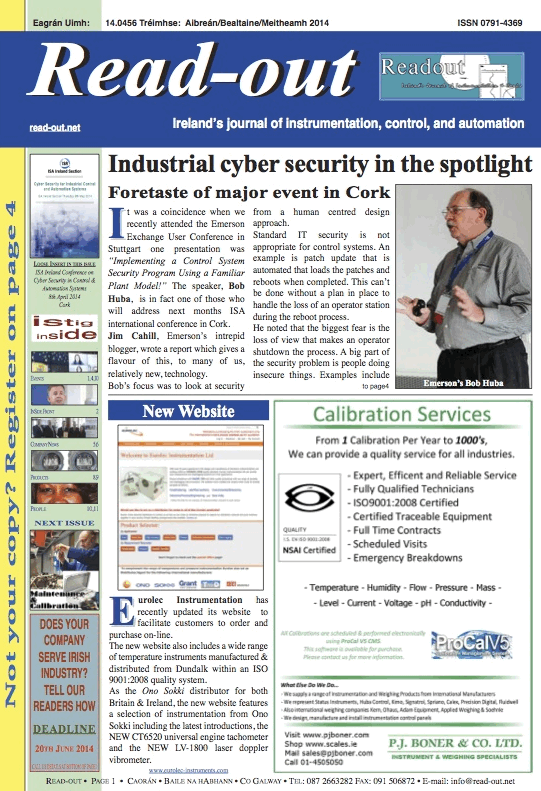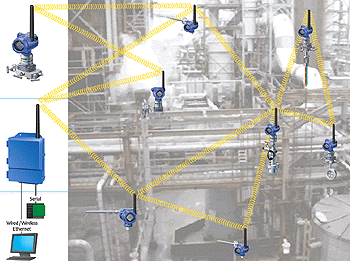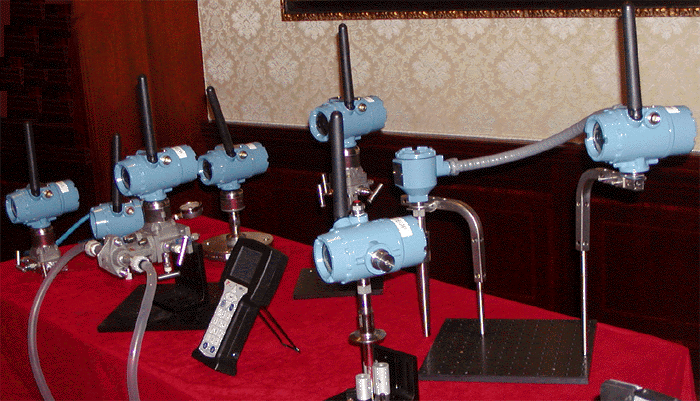

|
|












AWARDS
All contents copyright © 2007 Readout Publications
|
EMERSON & HONEYWELL BATTLE FOR WIRELESS TURF A couple of weeks ago (Jan. 2007) Emerson Process Management held its European wireless meeting in Bologna, Italy. Attendees reported that, though the program was great and the attendance excellent, there wasn't much that was new. The primary difference in Europe is that the 900 MHz frequency band which the Emerson wireless network uses in the US is not available in Europe - it is dedicated to emergency services. So, Emerson has now released wireless products in the 2.4 GHz band. After attending the Honeywell European User's meeting a couple of months ago (Nov. 2006), Andrew Bond provided an excellent summary of Emerson's meeting in his UK newsletter "Industrial Automation Insider", comparing the Honeywell and Emerson offerings. Honeywell is pushing for wireless standards (SP-100) and puts wireless in the wider context of plant wide communications. Emerson has focused primarily on eliminating copper between control systems and field devices. Both companies have adopted self-healing mesh-networks, but are deploying them at different levels. Honeywell's solution is based on a network of AC-powered iNodes, while Emerson markets battery powered field devices. Honeywell claims that unpredictable loads can result in unpredictable battery life. Emerson responds that their mesh protocol monitors loading if individual nodes and avoids that problem. For the skeptics who still may have had doubts at the Emerson meeting, a project leader for the BP refinery-of-the-future talked about successful trial runs of both the 900 MHz and 2.4 GHz products. He reported that much of the installation is straight-forward and requires very little engineering or training for the wireless part; configuring for power management requires some thought, to assure adequate battery life; and the physics of the shorter wave-lengths on the 2.4 GHz models requires some knowledge for setup. While Honeywell and other suppliers suggest that site surveys are needed for reliable operation, Emerson insists that none are required. Emerson says that site surveys are often obsolete during the time between doing it and actual systems implementation - things get built, tank cars move, etc. When signal reliability is important under changing plant conditions, mesh operation helps greatly. And the turf battles continue in this important new arena. Stay tuned... Jim Pinto 24 January 2007

|
Measurement, Control and Automation Resources throughout the World

|
A seismic shift in process automation |
What other Commentators thought |
|
The Emerson launch of their Wireless Offering in Europe was held in the historic city of Bologna. (see press releases in right hand column.)
This was a most significant place to launch such a product and concept as it is the birthplace of Marconi, discoverer of Wireless. Indeed the representatives of the 60 or so European publications were treated to the unique experience of a tour of the Villa Griffone, his childhood home, now a museum, where in his teenage years he started his experimenting, and, ultimately his success in transmitting signals over distances without the use of connecting cables.
It is a good idea that we should sometimes take time to consider the extraordinary advances that have been made in technology and how the insight and passion of young people like Guglielmo Marconi have made our world a better place. Simple and perhaps obvious ideas make such a difference and the young Marconi made a comment to his Mother - Anne Jameson, of the Irish Distillery family - that he was amazed that nobody else had thought of it. Now in the present day we listen to the Radio, and use our mobile phones without a thought of this young teenager experimenting in the attic of the family house without whose vision this might be impossible.
He briefly outlined the sometimes contradictory business conditions facing all process manufacturers. Things like keeping plants in mature markets competitive and effectively and safely operating new facilities in emerging markets with a less experienced workforce; managing wide variations in raw material cost and quality; retaining knowledge in company and of course meeting changing regulations. Despite the undoubted advances in modern technology there is still much we don't know, even within our own plants. For instance corrosion inside kilometers of pipes or full information on leaks and releases that could damage the environment and cost millions of Euro in fines. "The 'Age of Wireless' provides the eyes and ears to move facilities to the next level" he stated. Emerson started investing in next generation, in-plant wireless programme in 1998 and as of this year have completed 3 years of customer trials in actual industrial plants. From this they have assembled a large body of knowledge particularly from customer feedback. There trials included five major oil companies, two chemical manufactures and an O&G field operator. All this research unearthed seven wireless requirements in process industry. Cynics might say that they might have known these requirements without any research but research is just that, re-search and doesn't necessarily unearth new information but rather it shows us information already there. The requirements are reliability, low installed cost, industrial grade security, in accordance with approved standards, stress-free, control capability and low power. Like all requirements some will assume greater and others less importance as the application of wireless expands throughout industry. For instance the area of low power, which really is the problem of prolonging battery life, will only be important in areas where power is not available in a plant. The most interesting part of the Emerson scheme of things is the concept of what they call "self-organising." This allows for no single point of failure using a time syncronised mesh protocol (TSMP).  The area that has attracted most attention is in the area of cost savings which can be up to 90% in savings – since the use of signal cables is obviated. However there are other savings possible in the area of operation such as self monitoring of sensors themselves so that one can check the status of a transmitter without having to go out into the plant. Standards are important obviously and along with other manufacturers Emerson is participating in the various forums who are working to develop standards especially the ISA SP100 group which has a target of June 2008 to publish theis standard. However they have guaranteed to "protect your wireless investment by providing a guaranteed upgrade path to the future industry standard." The installation of most wireless involves "nothing special, it just works" and in addition there is a seamless integration between the wired and wireless world as far as a plant operator is concerned. The wireless option will be used in the monitoring area fairly easily and will gradually infiltrate into the more sophisticated areas of control as people become more familiar with the reliability associated with wireless devices. Perhaps the most extraordinary result of research by Emerson and other pioneers in this new application of wireless technology however is in the virtual flood of ideas coming in from potential users. "I could use it in this or this application…." Try it yourself and add to the list! The opportunities are real. Without the Limits of Wires…. Imagine What You Could See and Do
As Jim said the tectonic plates ARE moving and we appear to be witnessing a seismic shift in process automation. And it all started in the attic of a country house outside Bologna when the curious grandson of an Irish whiskeu producer asked "Why not?" Read-out Signpost Wireless Page |
Press Release
11th January 2007
Extends PlantWeb® to previously unreachable data for improved availability and operational performance
By capturing information that was previously inaccessible, Emerson’s Smart Wireless networks extend asset optimisation and predictive maintenance, helping manufacturers avoid costly, unexpected process interruptions and shutdowns; optimise performance and the lifetime of processing equipment; and maximise production output. Response to safety incidents can be improved, and emissions reduced. Extending Emerson’s PlantWeb digital plant architecture, the company’s Smart Wireless solutions are the industry’s first to use self-organising network technology to deliver data at unprecedented levels of reliability from assets previously out of physical or economic reach. Field trials with several North American and European customers over the last three years have demonstrated greater than 99 percent network reliability and an installed cost that is as much as 90 percent lower than a wired equivalent. Emerson’s Smart Wireless solutions combine innovative self-organising wireless network technology and gateways with wireless-enabled industry leading Rosemount® measurement transmitters and AMS™ Suite: Intelligent Device Manager predictive maintenance software, all seamlessly integrated with DeltaV™ and Ovation® automation systems or with legacy hosts. Self-organising networks are highly reliable because they allow wireless devices to serve as alternate communication paths, providing redundancy that enables over 99% of field network messages to reach their destination – no easy task in the “canyons of metal” that make up today’s manufacturing facilities. Networks using Emerson’s technology are scaleable from 5 to 100,000 devices. Installation of Emerson’s Smart Wireless solutions requires no complex site surveys or special tools. The solutions are designed to support SP100 control and monitoring application classes 1 to 5 on the same network, and have been proven by customer use for classes 3 to 5. Emerson’s SmartPower™ innovations enable battery life of 5 to 15 years depending on application. Industrial grade security of Emerson’s wireless networks has been validated in extensive field trials and through review by independent security experts. Encryption, authentication, verification, anti-jamming and key management techniques are used in a robust security approach. “Manufacturers hate surprises in their facilities, and have long wanted to have eyes and ears on every asset to know what is really going on in their operation,” said John Berra, president of Emerson Process Management. “Until now, there was no easy, reliable and economical way to reach all of the assets that needed monitoring. We’ve completed three years of customer field trials. In those trials, we’ve seen customers quickly discover and remedy problems that would otherwise have gone undetected.” Emerson’s Smart Wireless solutions can be deployed in various process manufacturing segments, including refining, oil and gas, chemical, pulp and paper, and water and wastewater treatment. In addition, the technology can be applied to remote monitoring of oil and gas well-heads, pipeline stations, and production platforms. Emerson’s global SmartStart™ wireless service experts help customers realise the full potential benefits of Smart Wireless solutions. They help with first start-up, including a full network health assessment to ensure robust communications plus verification of device functionality through the chosen output (Modbus, OPC, Ethernet, etc). “Wireless measurement technology will help users see and control more of what happens in their plants,” said Harry Forbes, an analyst with the ARC Advisory Group. “Besides huge savings in installation costs, this will drive fundamental process and automation improvements that are not possible with wired measurements.” “That’s what makes this the most fundamental improvement in process automation in decades,” continued Forbes. “ARC believes there is pent-up demand for wireless in both new and existing applications. Emerson’s strong brand and leading market position validates that the era of wireless measurement has arrived.” Emerson is working with equipment vendors, customers, and industry associations, including the Wireless HART® working group of the HART Communications Foundation and ISA SP-100, to develop wireless networking standards that meet the requirements of industrial monitoring and control, enabling the widespread adoption of wireless sensor networking technology. Emerson is guaranteeing an easy upgrade path for compliance to the industry standard when it is completed. To make it even easier for customers to reach the next level of business improvement, Emerson is introducing the SmartPack™ starter kit, consisting of SmartStart services; from 5 to 100 wireless Rosemount flow, pressure, level, or temperature transmitters; a wireless gateway; and an AMS Intelligent Device Manager software application for predictive diagnostic information access through the wireless gateway. By following easy best practices, the completely assembled, configured, and tested starter kit network will establish itself right out of the box, with no additional user input or set-up. “We are excited about making the 2.4 GHz Smart Wireless solutions available in Europe, following the high level of interest in 900 MHz Smart Wireless solutions following our launch in North America,” added Berra. “The experience and benefits demonstrated by field trials has created confidence and high interest in joining the age of wireless, and realising the new level of performance it promises; we’re thrilled to announce the technology for Europe.” More information about the newest additions to the Smart Wireless portfolio Emerson’s unique on-line PlantWeb University has added nineteen 15-minute courses that present a practical introduction to the technology and applications of in-plant wireless for operators, engineers and management. Also, within the next few months, Emerson will start an in-plant Smart Wireless design contest aimed at inspiring process engineers to unleash their imaginations and creative engineering spirit by submitting innovative applications they have found where wireless technology delivered new insight and business benefits. Their experiences, insights, and tips will form a foundation to speed wireless usage and benefits in the new age of wireless.
(See American launch details). This page has some illustrative pictures and diagrams. |

Wireless transmitting sensors at the European launch of Emerson's offering launch in Bologna (I)
The site is mantained by Eoin Ó Riain and any suggestions or thoughts are more than welcome.
Suggestions should be mailed to readout@iol.ie. Other Contact Details
The Signpost has been honoured to receive a number of awards.




 Walt Boyes at
Walt Boyes at  "The tectonic plates are moving!" exclaimed Jim Nyquist (right), President, Europe
Emerson Process Management, in his presentation to Journalists which he provocatively entitled "No wires no limits!"
"The tectonic plates are moving!" exclaimed Jim Nyquist (right), President, Europe
Emerson Process Management, in his presentation to Journalists which he provocatively entitled "No wires no limits!"
